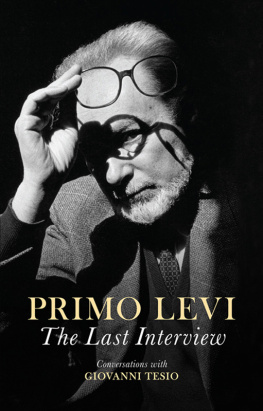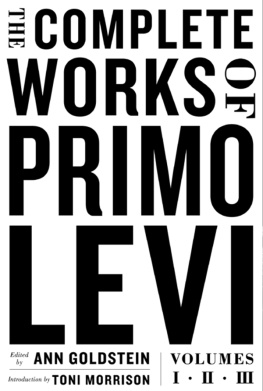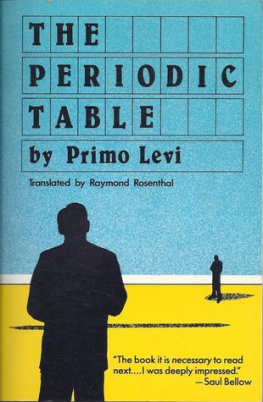Contents
Guide
Pages

The Black Hole of Auschwitz
PRIMO LEVI
Edited by Marco Belpoliti
Translated by Sharon Wood
polity
First published in Italian as Lasimmetria e la vita Giulio Einaudi editore s.p.a., Torino 2002
This translation first published in 2005 Polity Press
The right of Primo Levi to be identified as Author of this Work has been asserted in accordance with the UK Copyright, Designs and Patents Act 1988.
First published in 2005 by Polity Press
Published with the financial assistance of the Italian Ministry of Foreign Affairs
Polity Press
65 Bridge Street
Cambridge CB2 1UR, UK.
Polity Press
350 Main Street
Malden, MA 02148, USA
All rights reserved. Except for the quotation of short passages for the purpose of criticism and review, no part of this publication may be reproduced, stored in a retrieval system, or transmitted, in any form or by any means, electronic, mechanical, photocopying, recording or otherwise, without the prior permission of the publisher.
ISBN: 978-1-5095-2623-9
A catalogue record for this book is available from the British Library.
The publisher has used its best endeavours to ensure that the URLs for external websites referred to in this book are correct and active at the time of going to press. However, the publisher has no responsibility for the websites and can make no guarantee that a site will remain live or that the content is or will remain appropriate.
Every effort has been made to trace all copyright holders, but if any have been inadvertently overlooked the publishers will be pleased to include any necessary credits in any subsequent reprint or edition.
For further information on Polity, visit our website: www.polity.co.uk
Through the Looking Glass: Preface to the Italian Edition
In 1955, ten years after the end of the Second World War, Primo Levi wrote a brief piece for a Turin paper on the memory of the concentration camps, called Deportees. Anniversary. His argument was disheartening: the subject of the extermination camps, far from entering into historical memory, was in the process of becoming completely forgotten. It is a bitter article, but written in Levis habitual tone, measured, precise, and always to the point. He never surrenders to rhetoric, to wailing or cursing. The article also includes ideas which anticipate by thirty years parts of his most important, yet still little known, book, one of the most significant works of the twentieth century, The Drowned and the Saved. He speaks here of shame, of the common humanity of victims and torturers, and the contamination which was the lot of both groups in the camps, of European culture, the responsibility it bears, its science; he speaks of a defenceless and naked death, ignominious and vile, of the unsuspected reserves of viciousness and madness that lie latent in man.
The writer here is the author of If This is a Man, a book that is much more than an act of witness. A work of clearly literary inspiration, whose models are to be found in the Italian literary tradition and in the great European writers of the nineteenth century, this first book by the young Turinese chemist who survived the extermination camp of Monowitz, is also a treatise on human ethology. The camp, as he writes in the chapter of If This is a Man entitled The Drowned and the Saved, was a gigantic biological and social experiment. In the texts on Auschwitz published at intervals by Levi over the next two decades, whether in ex-deportee journals or in the columns of the most important national newspapers, he returns insistently to this experimental aspect, and to the fate that would have befallen the whole of Europe had Hitlers armies won the war.
Levi feels himself to be, more deeply even than being a Jew, a combatant for liberty, a resistance fighter, and the accent falls not only on the destiny of his people, but on that of all men and women deported to Germany, including the thousands of Italian soldiers who refused to swear an oath of loyalty to the fledgling Republic of Sal, over which the post-war period has cast a veil of silence. But across the rest of Europe too, and even in the State of Israel, there was silence on the subject of the death camps. Until the beginning of the sixties, and the trial of Eichmann, people preferred to forget. In these articles, the gaze Levi casts over the entire phenomenon is, as far as is possible, distanced, analytical, scientific almost. The ethologist of Auschwitz sought first of all to call on reason to describe what had happened, although the problem of understanding these dreadful events is from the outset beset with difficulty. Understanding means getting inside the head of the people who planned and carried out these crimes that are beyond all human measure; it means, as the ex-deportee points out several times, justifying something that is beyond human reason itself.
There is clearly no way out: stupidity and lack of reason, he writes, are forces that operate historically, and yet the perpetrators of Auschwitz, as he states in his preface to a book published in 1968 (Preface to L. Poliakov: Auschwitz), are prey neither to delirium nor to anger: they are diligent, calm, vulgar and one-dimensional. He goes so far as to hope that no man will appear in the near future who is able to elucidate, to explain why, at the centre of our Europe and of our century, the commandment Thou shalt not kill has been turned upside down. The work of banal and ordinary men, Auschwitz is something that plainly belongs to an asymmetry, to something that is human for they are still men, those who planned and carried out the monstrous extermination but at the same time, it is no longer human. Men who appear to be measured, grey, colourless empty, idiotic, placid and diligent, as he defines them in a 1959 text have been capable of carrying out acts that go beyond human understanding (The Monument at Auschwitz).
There is something inexplicable, as well as unacceptable. The rational root of man, postulated by the Greek thought that lies behind the anthropological reflections of the ex-Turinese schoolboy, is denied at root; and yet these men, the murderers of Auschwitz, remain nonetheless part of the human species. Incomprehensibility is invoked at various points throughout these writings. There are questions that in a low-key but subtly anguished tone find no answer: why Auschwitz? Will it happen again?
Faced with the collective suicide of the Temple of the People in 1978, and the solitary suicide of the philosopher Jean Amry, himself an Auschwitz deportee, Levi writes: Each and every human action contains a kernel of incomprehensibility. If this were not the case, we would be in a position to foresee what our neighbour will do. Clearly we cannot do this, and perhaps it is just as well that we cannot. This is the same problem as the camps. There are questions which recur insistently over the course of these pages, which span three decades, some dedicated to the black hole of Auschwitz, others, more curious and extravagant, on science, Judaism and literature; they return insistently and concern themselves precisely with the kernel of incomprehensibility.
For a man of scientific training, dedicated to a technical trade both practical and theoretical the chemist works with his hands but also with his brain, he is a detective of matter it is no minor thing to state that there exists a hard nucleus which, in a moral sense also, can be neither explained nor understood. Besides, it is plain to the ex-deportee there is both method and rationality in the madness and abnormal design of Auschwitz. Madness does not preclude this. Indeed, the very appearance of modesty and banality of the slaughterers fits perfectly with the anonymous and blind rationality of large modern institutions. Hss himself, the petit-bourgeois commandant of Auschwitz, is an inventor in his own way: it was he who solved the problem of extermination by inventing the gas chambers, Levi notes ironically.











